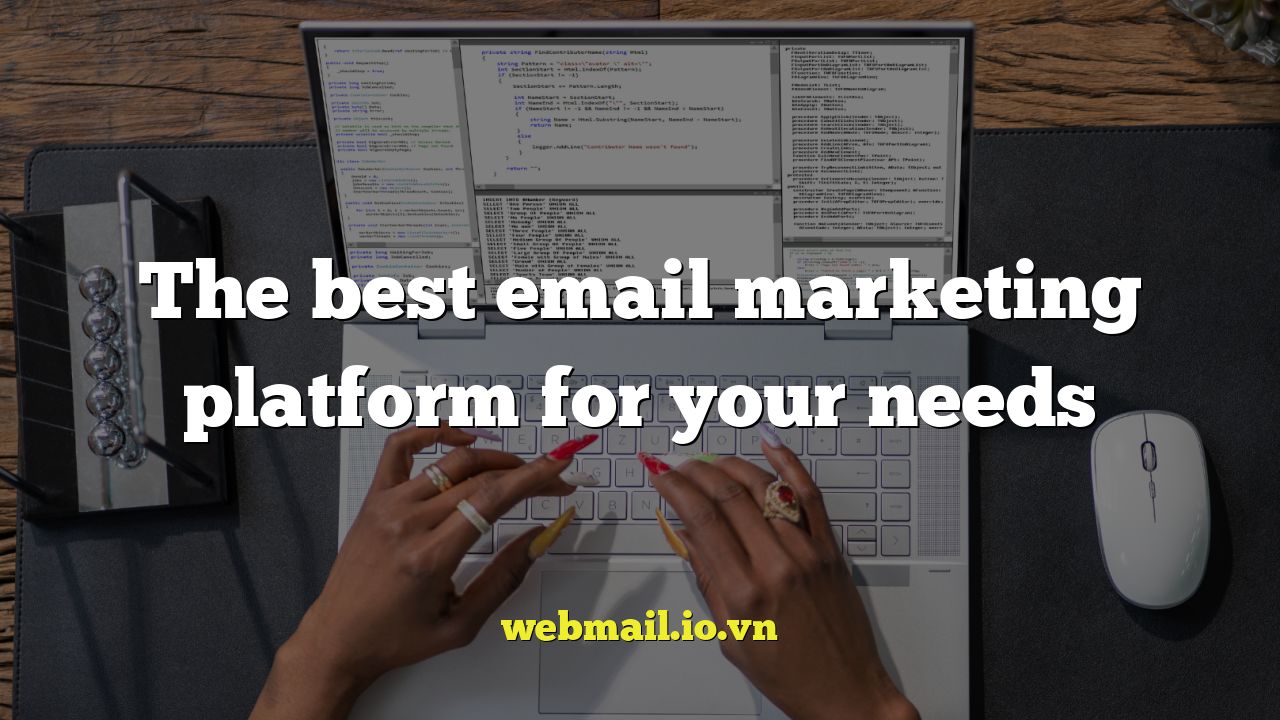
Choosing the Right Email Marketing Platform: A Comprehensive Guide
Email marketing remains a cornerstone of digital strategy, offering a direct line to your audience and driving conversions. However, with a plethora of platforms available, selecting the “best” one can feel overwhelming. The optimal choice hinges on your specific needs, budget, and technical expertise. This guide explores some of the leading email marketing platforms, highlighting their strengths and weaknesses to help you make an informed decision.
Understanding Your Needs
Before diving into platform comparisons, it’s crucial to define your requirements. Consider these factors:
- List Size: How many subscribers do you currently have, and how quickly do you anticipate growing?
- Budget: What’s your monthly or annual budget for email marketing?
- Features: What features are essential? Consider automation, segmentation, A/B testing, and reporting.
- Technical Skill: Are you comfortable with complex platforms, or do you prefer a user-friendly interface?
- Integration: Does the platform need to integrate with your CRM, e-commerce platform, or other tools?
Top Email Marketing Platforms: A Detailed Overview
We’ll now examine some of the most popular and effective email marketing platforms, outlining their key features and target audience.
Mailchimp
Mailchimp is a well-established player in the email marketing space, known for its user-friendly interface and comprehensive feature set. It’s particularly suitable for small businesses and startups.
Key Features:
- Drag-and-drop email editor
- Automation workflows
- Segmentation and targeting
- A/B testing
- Integrations with various platforms
- Free plan for up to 2,000 contacts
Pros:
* Easy to use, especially for beginners.
* Robust feature set even on lower-tier plans.
* Wide range of integrations.
* Strong community support and extensive documentation.
Cons:
* Can become expensive as your list grows.
* Automation features are limited on the free plan.
* Customer support can be slow at times.
GetResponse
GetResponse offers a comprehensive marketing automation platform that extends beyond email marketing. It’s a good choice for businesses looking for a more integrated solution.
Key Features:
- Email marketing automation
- Landing page builder
- Webinar platform
- CRM features
- Marketing automation workflows
- Advanced segmentation
Pros:
* All-in-one marketing platform.
* Excellent marketing automation features.
* Webinar functionality is a valuable addition.
* Good customer support.
Cons:
* Can be more complex to learn than Mailchimp.
* Pricing can be higher than some competitors, especially for advanced features.
Constant Contact
Constant Contact is another popular choice, known for its ease of use and focus on small businesses.
Key Features:
- Drag-and-drop email editor
- Email marketing automation
- Event management tools
- Social media integration
- List management tools
- Reporting and analytics
Pros:
* Very user-friendly interface.
* Excellent customer support.
* Strong focus on small businesses.
* Good deliverability rates.
Cons:
* Fewer advanced features compared to some competitors.
* Pricing can be higher than some other options.
Sendinblue
Sendinblue offers a cost-effective solution with a strong focus on transactional emails and SMS marketing.
Key Features:
- Email marketing automation
- SMS marketing
- Transactional emails
- CRM features
- Landing page builder
- Live chat
Pros:
* Affordable pricing, especially for businesses that send a lot of emails.
* Strong SMS marketing capabilities.
* Integrated CRM features.
* Good deliverability rates.
Cons:
* Interface can be less intuitive than some other platforms.
* Customer support can be slow at times.
ConvertKit
ConvertKit is specifically designed for creators, bloggers, and online course providers.
Key Features:
- Email marketing automation
- Landing page builder
- Form builder
- Segmentation based on behavior
- Easy integration with e-commerce platforms
- Focus on deliverability for creators
Pros:
* Designed specifically for creators and bloggers.
* Excellent deliverability rates.
* Powerful automation features for segmenting subscribers.
* Easy integration with e-commerce platforms like Shopify.
Cons:
* Can be more expensive than some other platforms, especially for larger lists.
* Fewer design options for emails and landing pages.
* Less focus on traditional marketing features like A/B testing.
ActiveCampaign
ActiveCampaign is a powerful marketing automation platform that’s well-suited for businesses with complex marketing needs.
Key Features:
- Advanced email marketing automation
- CRM features
- Sales automation
- Machine learning capabilities
- Predictive sending
- Dynamic content
Pros:
* Extremely powerful marketing automation features.
* Integrated CRM and sales automation.
* Advanced segmentation and targeting options.
* Excellent customer support.
Cons:
* Can be complex to learn and use.
* More expensive than some other platforms.
* Requires a significant time investment to set up and manage.
Pricing Considerations
Email marketing platform pricing varies considerably depending on factors like list size, features, and sending volume. Most platforms offer tiered pricing plans. Be sure to carefully compare pricing structures and understand what’s included in each plan.
Key Pricing Models:
- Subscriber-Based Pricing: Pricing is based on the number of subscribers in your list.
- Email-Based Pricing: Pricing is based on the number of emails you send per month.
- Feature-Based Pricing: Pricing is based on the features you need.
Many platforms offer a free trial or a free plan with limited features. This is a great way to test out a platform before committing to a paid plan.
Integrations
Integration with other tools is crucial for a seamless marketing workflow. Consider the following integrations:
- CRM (Customer Relationship Management): Salesforce, HubSpot, Zoho CRM
- E-commerce Platforms: Shopify, WooCommerce, Magento
- Social Media Platforms: Facebook, Twitter, LinkedIn
- Analytics Tools: Google Analytics
- Landing Page Builders: Leadpages, Unbounce
Making the Right Choice
Ultimately, the “best” email marketing platform is the one that best meets your specific needs and budget. Consider your list size, desired features, technical expertise, and integration requirements. Take advantage of free trials to test out different platforms and see which one feels the most comfortable and intuitive. Don’t be afraid to start with a simpler platform and upgrade as your needs grow.